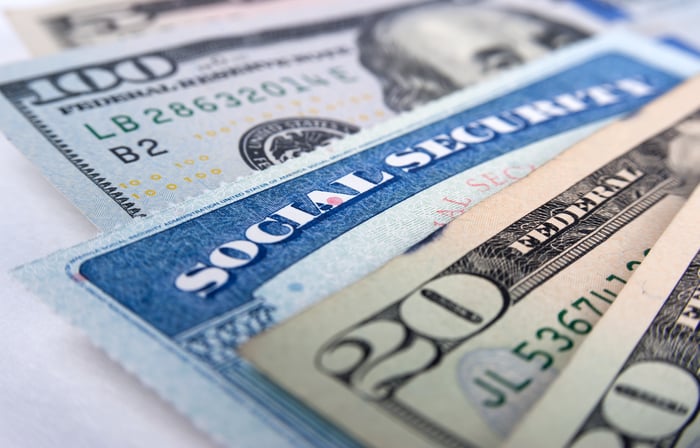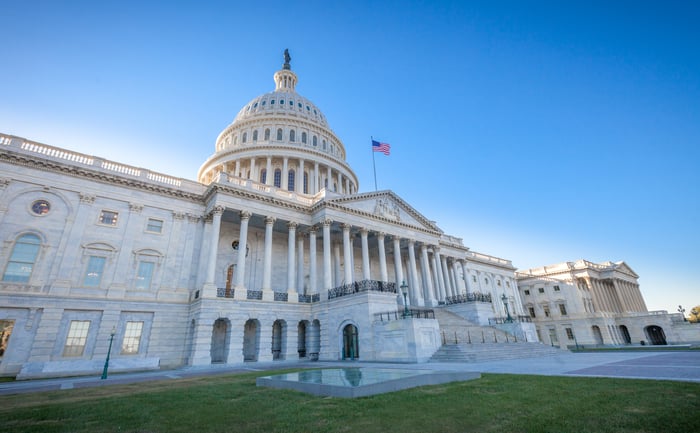Did Government Take Ss Funds Again
In case you haven't heard, America's top social program isn't on the best financial footing. According to the latest written report from the Social Security Board of Trustees, Social Security is staring down a $thirteen.9 trillion cash shortfall betwixt 2035 and 2093, with the expectation that its $2.9 trillion in asset reserves will be completely wearied in fifteen years.
On one hand, in that location is solace in knowing that Social Security isn't going bankrupt, which is a function of two of the program's acquirement sources beingness recurring (the payroll tax on earned income and the taxation of benefits). On the other manus, there's no sugarcoating the worry that would follow if benefit cuts of up to 23% are passed forth to and so-current and future retired workers, as of 2035. Retrieve, more than iii out of 5 current retirees lean on Social Security for at least one-half of their monthly income.
How did Social Security go into this mess, you ask? That's a source of contentious contend, and it's also a land mine of misinformation.

Epitome source: Getty Images.
Did Congress really raid Social Security?
One of the more common theories as to why Social Security is facing a huge long-term cash shortfall is that lawmakers in Congress have pilfered cash from the program and never returned it.
This idea goes all the way back to 1968, when then-President Lyndon B. Johnson fabricated a alter to how the federal upkeep would be presented. Prior to 1974, before Congress had an independent budgeting process, the President'southward Commission on Budget Concepts had 3 separate budgets, all of which had differing deficits. To simplify things, Johnson called for Social Security and its trust funds to be included in the annual federal upkeep.
In 1983, the Reagan assistants voted to disengage this change and once again remove Social Security from the federal budgeting procedure. This was done to ensure that changes made to the plan are done solely on the merits of the program, and not to balance the federal budget.
Where the idea comes into play that Congress stole from Social Security is, during this 1968 to 1990 menstruum (1990 is when Social Security was completely off-upkeep once more), it's believed that lawmakers commingled Social Security's asset reserves (i.eastward., its aggregate almanac net-cash surpluses congenital upward since inception) with its General Fund to pay for wars and other line items. The conventionalities among some folks is that Congress has stolen trillions of dollars from Social Security, and that if this money were but returned to the program, information technology wouldn't be in such dire financial shape.
But the real surprise, upon digging deeper, is that Congress hasn't stolen a dime from Social Security.

Image source: Getty Images.
Here's the truth virtually Social Security's Trust Funds and Congress' "stealing"
There are two important aspects of the incorrect notion that lawmakers stole from Social Security which need to be addressed.
Outset of all, in that location's the period between 1968 and 1990, which is believed to be when Congress pilfered America's top social program. What needs to be understood here is that, while Social Security'south ii trusts (the Old Age and Survivors Insurance Trust and Disability Insurance Trust) and its asset reserves were technically "on-budget," funding for Social Security and payouts remained entirely split up entities from the federal government'south General Fund. In plainer English, think of money inside Social Security'southward sphere as beingness completely untouchable past other money in the federal budget. This means at no indicate over this 22-twelvemonth period where Social Security was on-upkeep did a dime of Social Security income, benefits, or nugget reserves get commingled with the federal government's General Fund.
The second thing to realize here is that Social Security'due south nugget reserves are required past law to be invested into special-issue bonds and, to a far bottom extent, certificates of indebtedness. I'thou going to repeat that, in case you lot were skimming. Social Security $2.9 trillion in net-cash surpluses that have been built up over time aren't allowed to sit in a bank vault collecting grit. They're required to be invested in bonds by law.
Are these bonds sold by the federal government? Aye. But this doesn't equate to stealing. Rather, the federal government is borrowing uppercase that would otherwise exist losing money to aggrandizement and paying interest into the Social Security program on its borrowing. Yes, you read that correctly. Not simply is every cent the federal government has borrowed from Social Security accounted for, but the government is paying interest into Social Security, thereby improving the wellness of the plan. In 2018, $83 billion in interest income was collected past Social Security. If the folks who believe that Congress stole from Social Security got their way, and the federal government repaid every cent it borrowed, Social Security would accept lost out on this $83 billion in involvement income in 2018.

Paradigm source: Getty Images.
Want to blame something? Blame congressional inaction
If you lot yearn to point the arraign for Social Security's imminent cash shortfall on Congress, go correct alee. Only make sure you're blaming lawmakers for the right issue.
What Congress hasn't washed is steal from Social Security. However, lawmakers have known of the program'southward shortcomings since 1985, and accept even so to find a middle-ground solution to ready it. If yous want to point the finger at lawmakers, practise so because bountiful solutions exist, but political hubris appears to be getting in the way.
As you lot probably know, Democrats and Republicans each take a master fix for Social Security that works. Democrats wants to see the payroll revenue enhancement earnings cap raised or eliminated, which would require the well-to-do to pay more into the program. Meanwhile, Republicans favor a gradual increment to the total retirement age, which would lead to a reduction in long-term outlays from Social Security. Although both solutions get the job done, neither has the votes to laissez passer in the Senate.
Perhaps even more baffling, the perceived weakness of each solution is perfectly addressed by their opposition. For instance, the GOP's programme to reduce outlays takes decades before lower expenditures are realized. This is remedied past the Democrats' program to immediately boost tax revenue. Comparatively, the Republicans' programme helps to tackle lower nativity rates, rise longevity, and lower net-clearing rates that the Democrats' solution fails to account for.
If you want to blame Congress for something, let it be their lack of action to resolve the programme's imminent cash shortfall when so many solutions are on the tabular array.
robinsonthily1970.blogspot.com
Source: https://www.fool.com/retirement/2020/02/15/the-surprising-amount-of-money-congress-has-stolen.aspx
0 Response to "Did Government Take Ss Funds Again"
Post a Comment